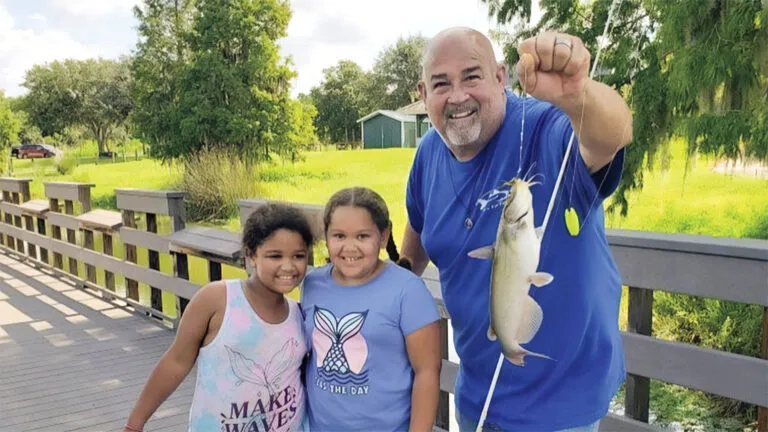Somewhere across the wide river lay my answer. Anxiously I settled in the dugout as paddles stabbed the Ogowe, each surge drawing me closer to Albert Schweitzer.
Meeting this great humanitarian had become vital to me. For in spite of the success of my acting career, I still searched for that indefinable something.
A magazine article by Schweitzer on world peace had spurred me to ask to visit him. The cable invitation came just as I was finishing a tour for my television role as Wyatt Earp. Grabbing a suitcase, I flew to Africa, hop-skipping into the interior by small planes until the battered dc 3 landed on the red dirt strip of Lambarene.
I was met by one of the volunteer doctors serving with Schweitzer, and soon we were heading four miles up the river to the famed hospital.
The jungle loomed higher, and a small knot of people came down to the bank. As we approached, I could make out the white walrus mustache under the white pith helmet. Our dugout ground gravel, and the gentleman stepped forward.
Cobalt-blue eyes looked into my soul. “Willkommen!” he said. His compassionate grip helped me realize that this was not a dream. For this meeting had long been a dream ever since I, when a pre-law student, had first read his writings.
Night sinks quickly in Gabon. And with the doctors and nurses we filed into the dining hall for the evening meal. Before dinner, we listened to the doctor softly play Bach on the zinc-lined harmonium. And then he read from a great Bible, his hands caressing its pages. I can’t understand German, but when he gave his interpretation, somehow the message touched me, and I sensed the deep love that flowed here in Lambarene.
Like the time when natives brought a badly injured man to the hospital. An attendant snapped, “This man is a thief. He was here before and stole drugs and sold them. He has no claim on us again.” The doctor’s eyes flashed. “What would Jesus have answered when someone came to Him in pain? Waste no time; get him to the operating room!”
The next morning I discovered that everyone works at Lambarene. As Schweitzer once said, “Usefulness is the test of value.” So I worked in the kitchen, built baby cribs, exercised old plumbing skills, and lugged supplies to the leper colony.
Goats and chickens wandered about the hospital. In the laboratory, I saw an attendant pursue a bee, gently capture it under a glass beaker and release the intruder at the window. It was the doctor’s orders. Schweitzer would fight even to save a tree from being cut down, reflecting the philosophy which summed up his spirit—reverence for life.
In explaining, he said, “To live in true humanity means to be inspired by the idea of reverence for all of life. If he finds a creature that needs help (and everyone finds such creatures), he will help. This will bring him happiness because he realizes that it is in his power to act for good. Though freeing a bee may seem insignificant, it should remind man of the mystery of life and the respect he should have for each life. It should make him a more human, thinking being.”
Love and respect for all of life. How far ahead of his time he was! For doesn’t his philosophy relate to what our ecologists stress today—that when any form of life is damaged, be it scarlet tanager or tidal marsh, all of nature and mankind suffers?
My opportunity to further explore Schweitzer’s thinking came after evening meals when an interpreter and I joined him in his study.
As he expressed his ideas, he’d close his eyes, slowly forming his words, a gnarled forefinger tapping the air for emphasis. I hung on each syllable, the interpreter’s voice just an echo. Again and again he stressed that though we all must work to live, our real purpose in life is to show compassion in helping others. Only then, he emphasized, do we become true human beings.
After our talks, I would lay awake on my cot and think on them. Many reaffirmed old personal beliefs. Others sparked new insight. But my special enlightenment was the full realization of Schweitzer’s statement: “So many people come here to Lambarene,” he said, “and others wish to but are unable to come. But everyone is capable of his own Lambarene.”
This was my truth. I couldn’t change the world, but I could do something on my own in my own way to put something back into life. I thought of the people already hard at work doing just this, from women ringing doorbells collecting for cystic-fibrosis research to men giving time and themselves to underprivileged kids. Instead of only taking from life, they were giving to it. Each was demonstrating his reverence for life. Each was creating his own Lambarene.
The mist was rising from the river the morning Doctor Schweitzer and I walked down to the landing to say good-bye. I got into the dugout, and the paddlers picked up a slow chant as we glided away.
I waved at the man in the white pith helmet under which shined those marvelous twinkling eyes. As he receded into the mist, I turned and faced my challenge. Would I just admire a memory, or would I try to create my own Lambarene?
Editor’s Note: After returning from Lambarene, Hugh O’Brian expressed his reverence for life by establishing a foundation to help young men develop leadership. Each year 60 outstanding high-school sophomores from every state and ten foreign countries qualify for a special week-long workshop, on subjects ranging from national politics to science. This year’s workshop was a space seminar held at Cape Kennedy, Florida.
“I have found my Lambarene,” says O’Brian. “And through it I’ve learned that the true gift is not so much in money but in time given in service to others. It is a gift that anyone can give, the priceless gift.
For more inspiring stories, subscribe to Guideposts magazine.






